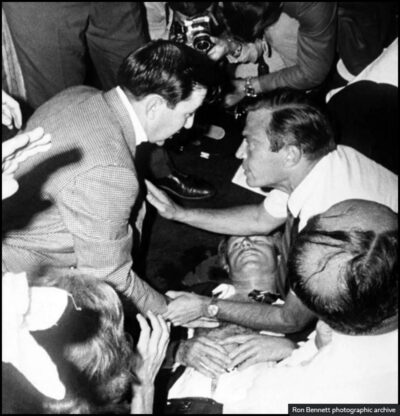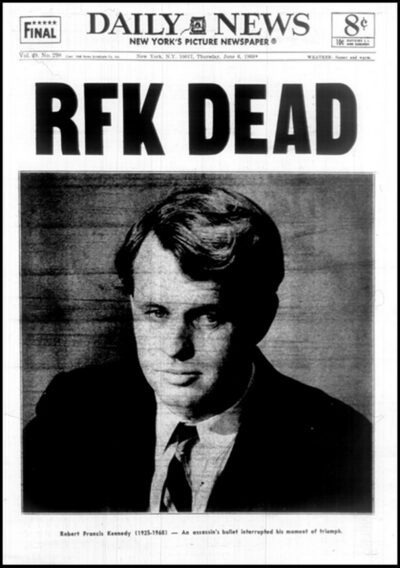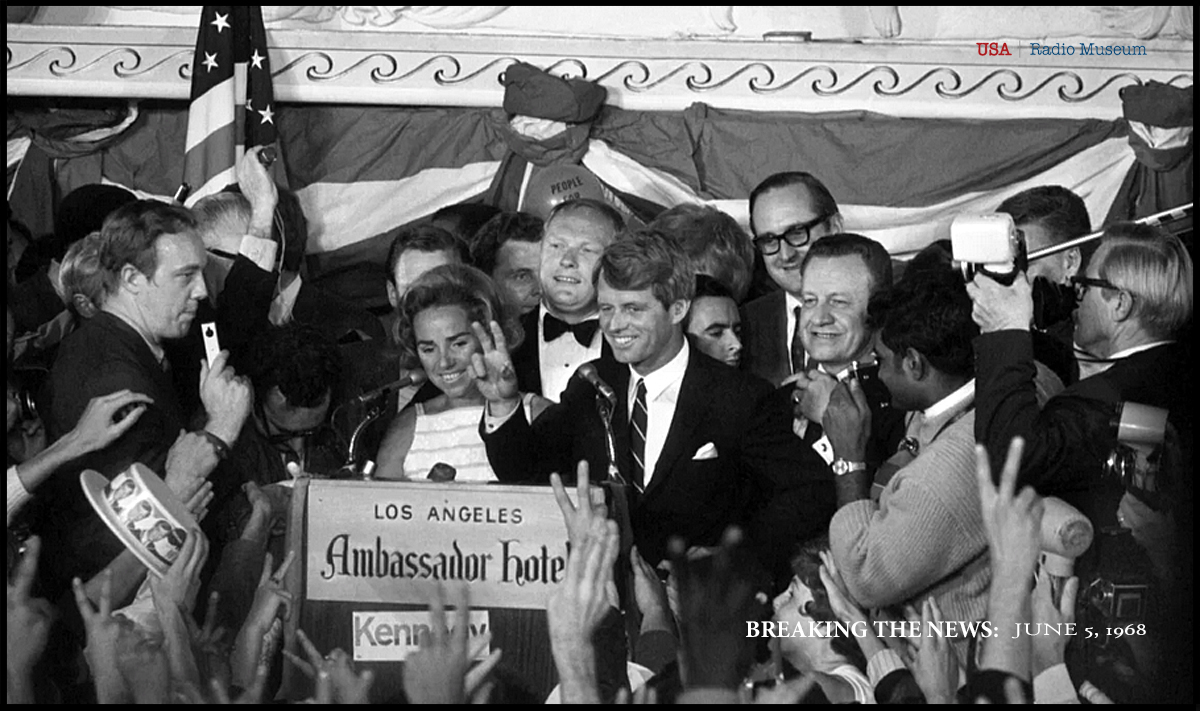A Voice for Change, Silenced. The Night Radio Told America RFK Is Dead A Night of Victory Turned to Tragedy June 5, 1968—The air inside the
A Voice for Change, Silenced. The Night Radio Told America RFK Is Dead
A Night of Victory Turned to Tragedy
 June 5, 1968—The air inside the Ambassador Hotel ballroom was electric. Robert F. Kennedy, fresh off his California primary victory, stepped onto the podium to address a jubilant crowd.
June 5, 1968—The air inside the Ambassador Hotel ballroom was electric. Robert F. Kennedy, fresh off his California primary victory, stepped onto the podium to address a jubilant crowd.
“Now it’s on to Chicago, and let’s win there!” he declared, his voice steady, filled with optimism. The crowd roared in celebration, pressing forward to shake his hand, to be near the man they saw as the future of America.
Then—chaos.
Gunfire shattered the night. Screams replaced applause. Kennedy, struck by bullets, collapsed onto the cold kitchen floor. The hope that had filled the ballroom moments before turned to horror.
KNX [Los Angeles] | Robert Kennedy Reported Shot | June 5, 1968
Audio Digitally Remastered by USA Radio Museum
KNX’s Urgent Broadcast: The Breaking News
Within minutes, KNX 1070 AM, Los Angeles’ premier radio news station, delivered its first frantic bulletin:
“Ladies and gentlemen, this just in—Senator Robert F. Kennedy has been shot!”
Listeners across the city froze. The newsroom scrambled to confirm details. Reporters at the scene described the panic, the rush to Kennedy’s side, the blood pooling beneath him.
“There is blood—he is not moving. People are crying, shouting for help.”
Sirhan Sirhan had fired the shots. He was tackled, subdued. But the damage had been done.
KNX continued its live coverage, keeping Los Angeles—and the nation—updated on Kennedy’s condition as he was rushed to Good Samaritan Hospital.
NBC Radio [New York] | RFK Assassinated | June 5, 1968
Audio Digitally Remastered by USA Radio Museum
The Race to Report: ABC, Mutual, and NBC’s Coverage
As KNX kept Los Angeles informed, national radio networks reacted swiftly:
- ABC Radio framed the tragedy within the political turmoil of 1968, speculating on its impact on the Democratic race.
- Mutual Broadcasting aired Andrew West’s gripping firsthand account, capturing the raw emotion from inside the hotel.
- NBC Radio focused on Sirhan Sirhan’s arrest and the investigation, piecing together the motive behind the attack.
Each network added a layer to the evolving story of a nation in shock.
KLWB [Los Angeles] Mutual Radio | June 5, 1968
Audio Digitally Remastered by USA Radio Museum
KNX’s Overnight Coverage: The Weight of History
As the early hours of June 5 unfolded, KNX remained on air, providing continuous updates:
1:00 AM: Kennedy was alive but critical. The hospital worked urgently to save him.
2:00 AM: Statements from President Johnson and political leaders expressed shock and grief.
3:00 AM: The investigation into Sirhan Sirhan’s motives intensified.
4:00 AM: Comparisons to JFK’s assassination surfaced, highlighting the devastating loss of two brothers to violence.
KNX’s coverage was not just news—it was history being told in real time.
KNX’s Role in Shaping the Narrative
KNX’s affiliation with CBS News ensured that its coverage was not just local—it was part of a national conversation. The station’s real-time reporting helped shape public understanding of the tragedy, providing both immediate updates and deeper analysis.
For more details, you can explore archival recordings and historical accounts at Los Angeles Times and Paperless Archives.
RFK’s Stance on Vietnam: A Lost Vision for Peace
Kennedy’s assassination was not just the loss of a leader—it was the loss of a radical shift in U.S. foreign policy.
Unlike President Lyndon B. Johnson, who had escalated U.S. involvement in Vietnam, Kennedy was a vocal critic of the war. He had called for a negotiated peace, arguing that the conflict was unwinnable and morally unjust.
“We must recognize that this war is not just a military conflict—it is a battle for the hearts and minds of the Vietnamese people,” Kennedy had said in a speech months before his death.
Had he lived to secure the Democratic nomination, his presidency might have ended U.S. involvement in Vietnam far sooner than history allowed. Instead, the war raged on, claiming thousands more lives before its eventual conclusion in April of 1975.
A Nation Mourns a Fallen Presidential Candidate
 The morning of June 6, 1968, was filled with a deep, unshakable sorrow. The nation awoke to a devastating reality—Robert F. Kennedy had died from his wounds.
The morning of June 6, 1968, was filled with a deep, unshakable sorrow. The nation awoke to a devastating reality—Robert F. Kennedy had died from his wounds.
Just hours earlier, his campaign had brimmed with optimism, a vision of unity, justice, and peace. Yet now, his supporters, his family, and the country at large were left reeling, mourning the man they believed could heal a fractured America.
At 2:00 AM, outside Good Samaritan Hospital, Kennedy’s press secretary, Frank Mankiewicz, stepped forward, his voice heavy with grief:
“Senator Robert Francis Kennedy died at 1:44 AM today.”
The weight of those words fell upon millions listening in silence, unable to fully process the loss. KNX, CBS, ABC, Mutual, and NBC Radio carried the announcement live, delivering the most somber of confirmations—the Senator was dead.
Across the country, tears replaced hope. In homes, in campaign offices, in gathering spaces, people sat stunned, reflecting on what had been stolen from them. Kennedy’s death was not just the end of a presidential campaign—it was the loss of a future many believed in.
The grief was made heavier by the memory of his brother, John F. Kennedy, gunned down just five years earlier, and the assassination of Dr. Martin Luther King Jr. just two months prior. The dream of peace, unity, and progress was suddenly slipping away, replaced with fear and uncertainty about what would come next.
Kennedy’s presence had offered a different path forward, particularly for those opposed to the Vietnam War. His calls for a negotiated withdrawal, his belief that war was not the answer, had given hope to those exhausted by America’s deepening involvement overseas. Now, with his passing, the war continued, spiraling further, claiming more lives, and dragging the country deeper into turmoil.
His absence was immediately felt in the political landscape. Without Kennedy leading the charge, the Democratic Party struggled to unify. Vice President Hubert Humphrey, now the nominee, attempted to rally support but lacked Kennedy’s ability to connect with working-class voters and anti-war activists. Meanwhile, Richard Nixon seized the moment, riding the wave of national chaos to win the presidency, further extending U.S. operations in Vietnam before an eventual withdrawal—years later, and at an unimaginable cost.
A nation mourned not just the loss of a man, but the loss of possibility. Kennedy had promised something different—an end to war, a fight for justice, a bridge to unity. His assassination ripped that vision away, leaving behind an America disillusioned, divided, and searching for answers.
CBS Radio | A CBS Special Bulletin | June 6, 1968
Audio Digitally Remastered by USA Radio Museum
Conclusion: The Echoes of That Night
Robert F. Kennedy’s assassination was more than a political tragedy—it was a turning point in American history. His vision for peace, justice, and unity was cut short, leaving the nation to grapple with war, division, and uncertainty.
KNX and the nation’s radio networks preserved the raw emotion of that night, ensuring that future generations could hear, feel, and understand the weight of his loss.
Kennedy’s final words—“On to Chicago, and let’s win there”—are now etched in history, not as the prelude to a campaign, but as the last statement of a man whose vision was tragically cut short.
Kennedy’s assassination wasn’t just the loss of a man—it was the loss of a future that never came to be. America had watched a beacon of hope suddenly extinguished, leaving unanswered questions about the direction the country might have taken had RFK lived to lead it.
_____________________
A USARM Viewing Tip: On your mobile or tablet device? Finger-tap all the above images inside the post and stretch image across your device’s screen for LARGEST digitized view.

